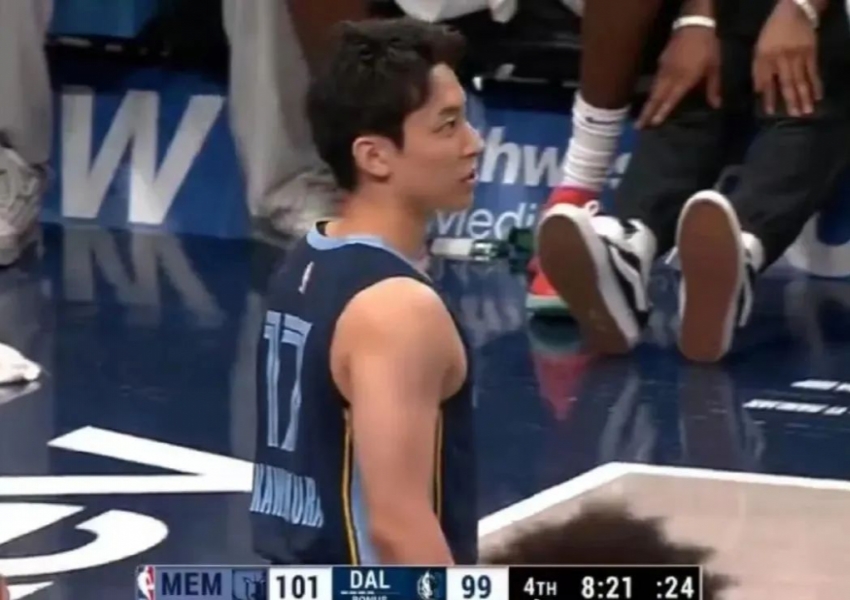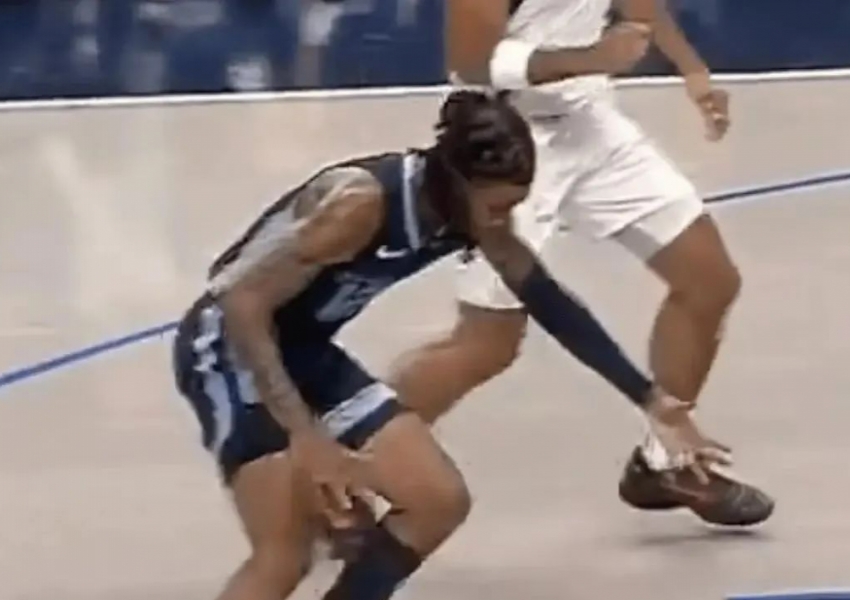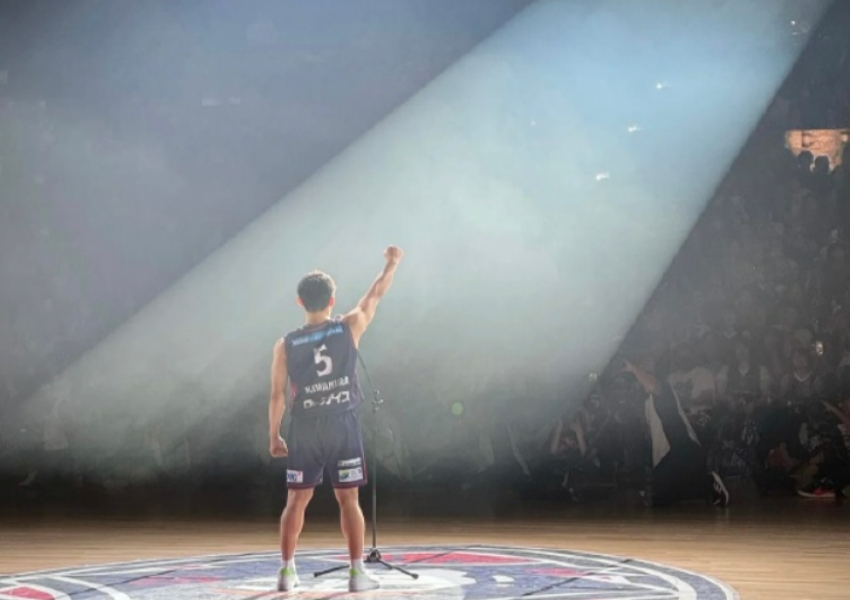China’s Basketball Envy: Memphis Debut Nets 5 Points for New Asian No. 1 Point Guard
In a thrilling preseason game, the Memphis Grizzlies defeated the Dallas Mavericks 121-116, but the spotlight was on the long-awaited return of Ja Morant. After serving a nine-month suspension, Morant made his return to the court, playing 18 minutes and contributing 13 points, 4 rebounds, 3 assists, 1 steal, and 1 block. His performance was cut short, however, as he twisted his ankle, forcing him to sit out the remainder of the game.

Though the injury isn’t considered serious, it's likely that Morant will miss the remaining preseason games to ensure he’s fully recovered for the regular season. While Grizzlies fans anxiously await Morant’s full recovery, this situation opens the door for Japanese guard Yuki Kawamura to potentially see an increase in minutes and opportunities, especially as a playmaker.

Kawamura, who signed an Exhibit 10 contract with Memphis, made his preseason debut against the Mavericks, coming off the bench for 9 minutes. In limited time, he managed to score 5 points on 1-of-2 shooting from the field and 2-of-2 from the free-throw line, while dishing out 3 assists and finishing with a plus-minus of +6. His performance, though brief, was impressive, especially considering the pressure of debuting in the NBA as one of the shortest players in the league at 5'8" (1.73 meters).

Despite his limited time on the court, Kawamura’s impact caught the attention of many, including numerous fans in China, where the 23-year-old Japanese player has garnered significant attention. Some Chinese fans have even gone as far as to claim that Kawamura outshined Morant, further fueling the comparison between the two guards. Kawamura’s play has become a hot topic among Chinese basketball fans, and his rise to prominence has sparked a conversation about the future of Chinese basketball and the scarcity of elite point guards in China.
Yuki Kawamura: Asia's Rising Star
Kawamura is not a stranger to big moments. This past summer, he led the Japanese national basketball team in the 2024 Paris Olympics, putting up impressive stats. Averaging 20.3 points, 3.3 rebounds, 7.7 assists, and 1 steal per game, Kawamura was the driving force behind Japan’s success in the tournament. His shooting percentages, though not elite (33.9% from the field, 40.6% from three-point range, and 100% from the free-throw line), showcased his ability to handle pressure in crucial moments and his comfort on the international stage.
While Kawamura is undersized by NBA standards, even shorter than Isaiah Thomas (who is listed at 5'9"), his poise and basketball IQ have helped him stand out. His debut for the Grizzlies, though brief, demonstrated his ability to control the game as a floor general and make timely plays. Whether it’s launching a three-pointer or threading the needle with a clever pass, Kawamura played with the kind of confidence and finesse that one would expect from a seasoned veteran.
Kawamura’s size might make him a rarity in today’s NBA, but his skill set is invaluable. His quickness, vision, and decision-making on the court have drawn comparisons to some of the best undersized guards in history. More importantly, his rise has been a significant moment for Asian basketball, as Kawamura could be the player who leads the charge for the next generation of Asian guards in the NBA.
The Scarcity of Chinese Elite Point Guards
Kawamura’s success has prompted many Chinese basketball fans to ask a painful question: When will China produce a point guard of Kawamura’s caliber?
For years, the lack of a high-level point guard has been one of the most glaring weaknesses of the Chinese national basketball team. While China has had great forwards and centers, such as Yao Ming and Yi Jianlian, the point guard position has been an area of concern. Even with talented players like Liu Wei in the past and current guards such as Guo Ailun and Zhao Jiwei, the Chinese team has never had a guard who could dominate on the FIBA stage the way Kawamura has for Japan.
The lack of a true floor general has hampered China’s ability to compete at the highest level in international basketball. Point guards are often considered the “brain” of the team, responsible for orchestrating the offense, controlling the tempo, and making critical decisions. Without an elite point guard, a team’s ceiling is limited, and this is a reality that China has faced for years.
While players like Guo Ailun have shown flashes of brilliance, they have not been able to consistently deliver on the international stage. Guo, known for his quickness and scoring ability, has struggled with decision-making and turnovers, making it difficult for him to take the reins as the team’s leader. Zhao Jiwei, another talented Chinese guard, has been praised for his defense and playmaking, but he too has not lived up to the high expectations placed upon him.
One of the key reasons for this lack of development is the structure of the Chinese Basketball Association (CBA). Unlike the NBA, where young players are given significant playing time and the freedom to make mistakes and learn, the CBA has often prioritized winning over player development. The league’s foreign player policy, which allows teams to field up to seven foreign players over four quarters, means that the ball is often in the hands of American or European imports, leaving local players, particularly guards, with fewer opportunities to develop their skills.
Point guard play, in particular, is highly dependent on having significant ball-handling responsibilities. It’s a position that requires a player to learn through repetition, gaining experience in running the offense, making reads, and adjusting to different defensive schemes. Without this experience, local guards in the CBA are often relegated to secondary roles, where they don’t receive the ball-handling duties necessary to grow into elite floor generals.
This has been a vicious cycle for Chinese basketball: without proper development at the point guard position, the national team continues to struggle, which in turn hampers the development of the next generation of guards.
Can China Produce Its Own “Kawamura”?
It’s clear that Chinese basketball fans are envious of Japan’s success with Kawamura, but the real question is whether China can develop its own version of the dynamic guard. The answer is complex, but there are glimmers of hope.
For one, China’s youth basketball programs have improved significantly in recent years. There is a greater emphasis on skill development, especially at the guard position. Players are being taught the fundamentals of ball-handling, shooting, and decision-making from a younger age, which could lead to a new wave of talented Chinese guards in the coming years.
Additionally, the CBA has reformed its foreign player policy for the upcoming season, reverting to the 4-quarter, 7-player format. This change could allow for more playing time for local players, particularly in the backcourt. If Chinese guards can rise to the challenge and compete with foreign imports, there’s a chance that one or two could break out and make a significant impact on both the CBA and the national team.
Ultimately, developing an elite point guard is not just about talent; it’s about opportunity. Kawamura had the chance to showcase his skills on the international stage, and he seized it. If Chinese guards are given similar opportunities, and if they can develop the necessary skills to run a team at the highest level, there’s hope that China could one day produce a point guard who can compete on the same stage as the NBA’s best.
The Road Ahead for Kawamura and the Grizzlies
As for Kawamura, the road ahead looks bright. While he may be fighting for a roster spot, his performance in the preseason has certainly caught the attention of the Grizzlies’ coaching staff. With Morant sidelined temporarily, Kawamura’s role may expand, giving him more opportunities to prove his worth.
If Kawamura can continue to impress, he has a real chance of securing a more permanent role in the NBA, further solidifying his status as Asia’s top point guard. His journey is one that not only inspires fans in Japan but also sparks hope across Asia, where basketball continues to grow in popularity.
For Chinese basketball fans, Kawamura’s rise is both a source of pride and frustration. While they celebrate his achievements, they also wonder when their own country will produce a guard who can lead the national team to success on the international stage. Until then, Kawamura’s success story will serve as both a blueprint and a reminder of the work that remains to be done.
Copyright Statement:
Author: focusnba
Source: FocusNBA
The copyright of this article belongs to the author. Reproduction is not allowed without permission.
Recommended Blog
- Injury-Prone Again! Can Malcolm Brogdon Be the Missing Piece for a Championship in His Contract Year?
- It's Official! Zhang Zhenlin to Miss CBA Games — China's Best Forward Temporarily Sidelined
- Frustration Grows: Cui Yongxi’s Preseason Struggles, 0-4 Shooting, and a Teammate Hogging the Ball
- A Few Words, Two Teams Offended: Does Bradley Beal Want Out of the Suns?
- 8+7 Per Game, Worth Two First-Rounders? Is 23-Year-Old Walker Kessler Really Worth the Price?
- Breaking News: Serious Wrist Injury! Exum's Fragile Career Takes Another Hit
- Born in 2004, Rim-Bending Power! More Explosive Than Zion? Pelicans Shaking Up the Western Conference Title Race
- 19 Minutes, 6 Three-Point Attempts! Westbrook Has Changed: Nuggets’ Championship-Level Signing
- It’s Confirmed! "Houston Harden" Mode Activated: Will James Harden Explode This Season?
- Explosive Debut! Zhao Weilin Drops 12 Points, 10 Assists: The Closest Chinese Guard to the NBA
Hot Blog
- Tension in New York? Mikal Bridges Calls Out Thibodeau’s “Plantation-Style” Rotation!
- Kevin Durant = Three First-Round Picks? In Just Two Years, the Suns Lost Big!
- Major Decline! What Is De'Aaron Fox’s True Level with the Spurs?
- Completely Out of the Rotation! Why 25-Year-Old Cam Reddish Can't Get on the Court Anymore
- A Miraculous Buzzer-Beater—But What Level Is Kawhi Leonard Really At Now?
- 4,000 Threes! Just How Impossible Is Stephen Curry’s Latest Record?
- $293M Supermax and an MVP? Is There Any Doubt Left for Shai Gilgeous-Alexander?
- $110 Million Over Two Years—Butler Was Worth Every Penny
- $418M for Luka Dončić? Is the Lakers' New Star Worth It?
- 31-21-22! Did Jokic’s Historic Triple-Double Just Reignite the MVP Race?